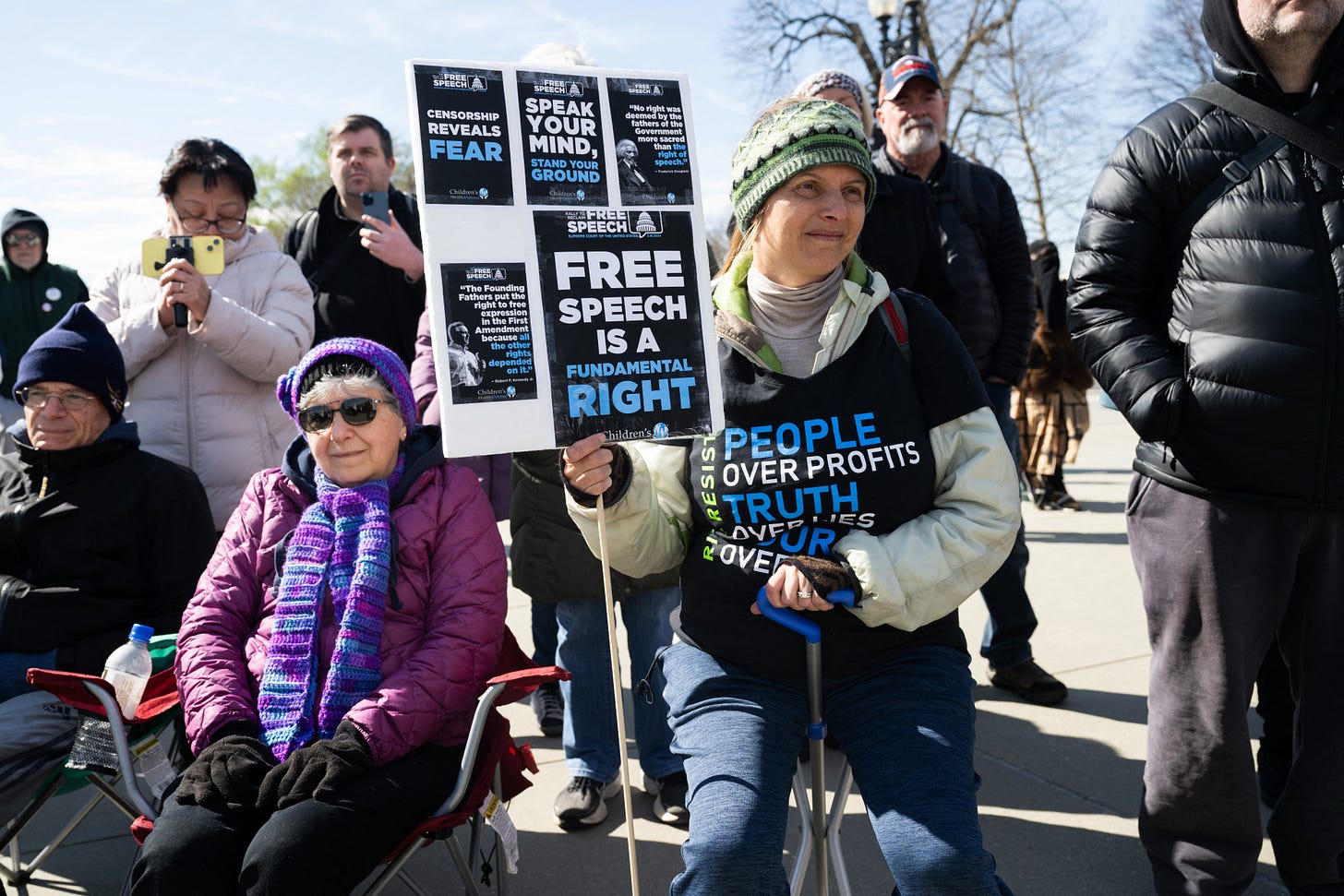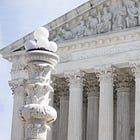Big Tech Companies Have Free Speech Rights Too
It’s misguided to ban them from moderating content as they see fit—even if we don’t like their decisions.

It’s been a jam-packed year here at Persuasion, and our team is in need of a break! From next week we are going on our annual leave until early September. During this period we will re-publish some essays of which we are particularly proud from the past 12 months. In addition, you will still receive Yascha’s weekly column and new episodes of The Good Fight podcast. (And if something huge happens in politics, we may try to respond!) As ever, thank you for your continued support—and if you value the work we do, please use this opportunity to become a paying member of our community today!
There is a near consensus in politics and media these days that Big Tech, and social media in particular, is bad for America. The left has been skeptical of these platforms ever since Hillary Clinton’s loss to Donald Trump in 2016, blaming them for allegedly allowing Russian misinformation to influence the election results. The Republican Party only really started to turn on these platforms in 2020 and 2021, as they began implementing increasingly censorial content moderation policies.
In this hostile environment, Florida and Texas passed legislation restricting how social media sites could moderate user-generated content. The laws, in the words of Supreme Court Justices Barrett, Sotomayor, and Jackson, are “sprawling,” “broad,” and “susceptible to multiple interpretations.” But their general thrust is to reach deep into the product design of sites like Facebook, X, and YouTube to curtail their ability to ban users, filter content, and rank posts.
The laws recently made their way to the Supreme Court in a pair of cases called Moody v. NetChoice and NetChoice v. Paxton. The Court’s holding, released in July, was technical, with all nine justices agreeing that lower courts had focused too narrowly on how the laws affected big platforms like Facebook and X and needed to reconsider their constitutionality more generally. But a majority of justices also signed onto an opinion written by Justice Kagan giving guidance to lower courts and making clear that certain parts of the laws—including “restrictions on the platforms’ selection, ordering, and labeling of third-party posts”—interfere with the platforms’ expression and First Amendment rights.
This argument upset critics of Big Tech and social media companies. Persuasion editor Sam Kahn was among this group, writing last month that the Supreme Court had espoused a “philosophy [that] gives the social media companies carte blanche to moderate—or censor—as they wish.” I empathize with Sam and others who are frustrated with social media companies. These platforms have often been too quick to shut down debate, and this instinct has hurt our public discourse.
But frustration is not a good reason to overlook violations of the First Amendment or to make excuses for poorly crafted, reckless legislation. Unfortunately, that is precisely what critics of the Supreme Court’s opinion have done—inventing intricate explanations for why the Texas and Florida laws don’t violate the Constitution. But their tortured justifications fall flat when put up against the straightforward argument on the other side: social media platforms are engaged in expression and therefore enjoy First Amendment protections. No amount of legal gymnastics can make those protections disappear, and the Supreme Court was right to say as much.
The principal question here is whether content moderation by social media platforms is a form of expression protected by the First Amendment. Defenders of the Texas and Florida laws say that it is not because “censorship” is not really a form of speech. They also defend the laws on the grounds that the state has good intentions, namely “protecting a diversity of ideas and viewpoints.” This is more or less the case that Florida and Texas made during oral arguments, and it also resonates with the point that Sam made in Persuasion, where he lamented the Supreme Court’s position that, essentially, “algorithms—even ones that amount to censorship—are to be treated as a form of expression.”
At first glance, these arguments can be persuasive. In an abstract sense, they seem to point in the direction of free speech. But what these arguments miss is that choosing not to say something is itself a form of expression. Think about the newspaper that rejects submissions, the bookstore owner who refuses to sell certain books (or organizes them in order to make some expressive point), the bakery owner who doesn’t make cakes that express ideas they disagree with, or the parade organizer who excludes a group based on that group’s message.
It doesn’t matter whether you categorize these examples as “content moderation,” “editorial discretion,” or “censorship”—the fundamental point is that they show how excluding content from an expressive product can be a form of speech. The government may not ignore the right to such expression simply because it is automated by an algorithm or because the government says it has good intentions. As Justice Kavanaugh noted during oral arguments, “the concept that the government may restrict the speech of some elements of our society in order to enhance the relative voice of others is wholly foreign to the First Amendment.” The majority of the Supreme Court agreed, writing that “deciding on the third-party speech that will be included in or excluded from a compilation—and then organizing and presenting the included items—is expressive activity of its own. And that activity results in a distinctive expressive product.”
In an attempt to skirt those First Amendment protections, proponents of social media regulation argue that we should treat these platforms like we do airlines or railroads—as so-called “common carriers” who are required to serve all comers without discrimination. For example, the Texas law says that because “social media platforms function as common carriers,” they should not be allowed to “censor a user” or “otherwise discriminate against expression.” Sam touched on the same idea, arguing that the Supreme Court should have depicted social media platforms as common carriers and allowed the government to regulate their use of “discriminatory algorithms.”
But “common carrier” is not an incantation that magically strips an entity of its First Amendment protections. This point was hammered home repeatedly during oral arguments, including by both Texas’s and Florida’s solicitors general, who acknowledged that common carriage rules cannot be used to shut down an entity’s right to its own speech. The problem for Texas and Florida is that—as the Supreme Court rightly decided—creating curated newsfeeds and timelines falls directly under that umbrella of protected speech. And so even if the government could use common carrier status to regulate the companies in some ways (requiring them to allow anybody to make an account for browsing or direct messaging, for example), the platforms would still maintain the First Amendment right to produce their newsfeeds and timelines as they see fit.
More generally, though, I am perplexed by the common carrier argument. By any definition, social media platforms as they exist today are obviously not common carriers. Social media’s core function is to discriminate between different users and their speech. This discrimination can range from good (like demoting racial slurs) to neutral (like boosting content that users will find compelling) to pernicious (like removing posts about the Covid lab leak theory). But regardless, it is no secret that social media platforms have their thumbs on the scale. Not even the most oblivious users would be surprised to learn that their posts on X or Facebook are subject to community standards, content filters, and algorithmic sorting.
In other words, the platforms are engaged in extensive and well-publicized discrimination. This makes them precisely the opposite of common carriers. So even if the First Amendment disappeared, the question is not whether social media platforms as they exist today are common carriers. The question is whether the government should have the power to reengineer the purpose of these platforms—turning them from pro-discrimination machines into anti-discrimination machines—simply by invoking the words “common carrier.” That is a genuinely radical proposal, and it would hand the government a powerful new tool to shape and control vast swaths of the private sphere.
Beyond the legal considerations, there are the practical consequences of making social media platforms treat all third-party speech equally. Imagine what this would look like in practice. If a platform allowed content discouraging teenage suicide, it would need to give equal footing to content encouraging teenage suicide—it couldn’t promote or demote one but not the other. The same goes for posts supporting Nazi ideology, espousing racism, glorifying rape and gender-based violence, and discouraging the use of vaccines. And, as the Supreme Court’s majority noted, “the list could continue for a while.” The attorney for Texas said as much on the example of terrorist speech, admitting that the law would mean that platforms “can’t … have the, you know, anti-Al-Qaeda but not the pro-Al-Qaeda.”
Have the advocates of common carrier status actually thought this through? Did the legislators in Florida and Texas? The entire purpose of social media is to help users encounter content that they like and find compelling. And for all their flaws, social media giants generally do a pretty good job at that. These laws would make that service flat-out illegal, turning X, Facebook, and YouTube into gigantic firehoses of unfiltered, unsorted content. That would be a shame. If people want that experience, 4Chan and Gab already exist. There is no good reason to turn popular social media platforms into bigger versions of these internet swamps. Ultimately, if the Florida and Texas laws were enforced, they would not only lead to a more deranged and disturbing internet, but also a less useful, more boring one.
One particularly regrettable aspect of this saga is that conservatives are often the ones leading the charge. A core principle of conservatism is that good things are easily destroyed, but not easily created. And while the First Amendment and the Internet may not be perfect, they are two of the most remarkable things that human beings have ever created. It will be a sad irony, and a colossal mistake, if conservatives continue leading the effort to dismantle them.
Seth Moskowitz is an associate editor at Persuasion.
Follow Persuasion on Twitter, LinkedIn, and YouTube to keep up with our latest articles, podcasts, and events, as well as updates from excellent writers across our network.
And, to receive pieces like this in your inbox and support our work, subscribe below:




This is well argued. One problem I see with it, though, is this. Social media companies' content moderation algorithms are fundamentally built to maximize engagement and therefore profit, not primarily to express the companies' own opinions. This, it seems to me, places them in the realm of commercial speech, to which we do permit some statutory limitations.
I'm not sure exactly where I'm going with this -- just arguing that these companies' free speech rights are not sacrosanct.
Shouldn’t the public have its own platform then? A PBS-like non-profit social media platform where We the People are not silenced by moneyed interests?
What do you think?